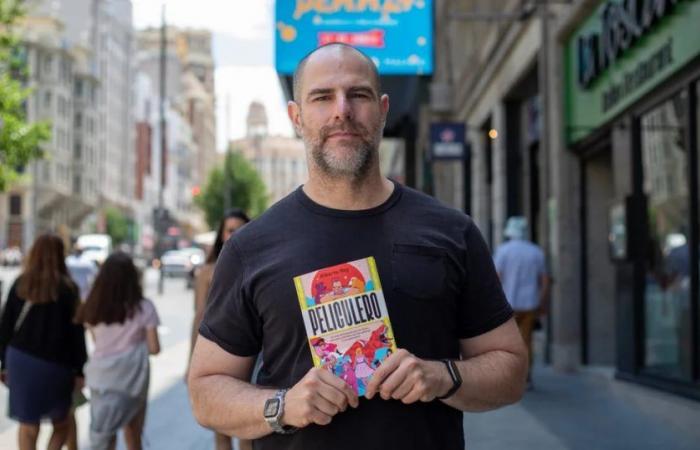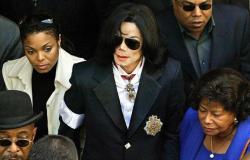
He has anecdotes to write another book, but he comes to present film maker (Editorial Península), a title that perfectly encapsulates the emotional aspect that he has printed in a work with which he intends to talk about the films that have marked his life, and the chronology of the always eccentric Hollywood. Alberto Reyan expert in all audiovisual aspects, speaks with Infobae Spain about the first novel that he liked to read of all the ones he has published so far. “Movies are also the people who watch them”, indicates to this medium. In his case, and just as a romantic comedy does not receive the same reading in a situation of falling in love as in a situation of breakup, “I always thought that the most natural way to tell about my life” was to do it through the feature films that mark his diary.
He admits that “the important thing is what you remember, not what happened,” which is why he does not mind admitting that many of the pages in which he pours his fervor for Harrison Ford, Belen Rueda either Alien: the eighth passenger “they have no criticism or reasoning behind them.” film maker It is a journey through series and films that mark progress and change, not only in their author, but also in the industry. As a critic, he considers that cultural journalism draws “from stories that everyone empathizes with”: “People find it very morbid that we get into the movies they watch”says.
He believes that cultural criticism has evolved towards a panorama in which profiles like Carlos Boyero, the literary punch (now also vocal) of the average director and the big-budget film, do not exist beyond his own figure. “Carlos is probably the last person who makes a living from making cultural opinions who is not afraid of being left without an interview or without access,” he says. He believes that the rest of his colleagues in the sector “censor themselves” in order not to lose business with large producers or distributors. “The ideal would be that we could say what we want at all times”, but the media live on “advertising”, an important source of income. “Any person who has censored themselves, or who has softened their words, in exchange for keeping their job has my full support. The important thing is to eat and pay the rent, movies are not,” she says.
“Any person who has self-censored in exchange for keeping their job has my support. The important thing is to eat and pay the rent, the movies are not”
Through the various chapters that shape film maker, Rey analyzes the vital transitions of the most important elements within the seventh art: its stars, those human beings gifted in the art of acting who are capable of carrying a film (or a saga) behind them. “He star system “Hollywood has had many variations throughout its history, but we are at a point where many of the things that define a star, such as mystery, are blown up,” indicates the author. The only names that remain within the Hollywood designation of origin are, for the critic, Zendaya and Timothée Chalametto whom he attributes “a soul of mocatrix important”, because he is fascinated by “being famous.” Outside of the duo that stars in the new films of Dune directed by Denis Villeneuve, “the rest gives a feeling of overexposure” that can generate disenchantment.
Another of the stars who, he considers, maintains the engagement of yesteryear is Kristen Stewart. “She played exposition with Twilight“, but his reconversion into icon queer He returned everything to the initial box. “Suddenly everyone loves Paul Mescal”, he says about the frenzy of consuming the daily life of the five-year celebrity. “It seems to be very obvious, to be in the soup, but on the other hand I think that, perhaps, they have no other option,” she adds.
“Hollywood’s ‘star system’ has had many variations, but we are at a point where many of the things that define a star, such as mystery, are being blown up”
Despite the loss of enigmas associated with personality, Alberto Rey believes that Hollywood has done something well: integrating the actors from the most notable fictions into its star system. “They are the center of the cultural conversation”, says about the most viewed series on platforms such as Netflix, Max or Prime Video. “Then you have people like Scorsese saying the things he says, but his last film was paid for by Apple and the previous one was paid for by Netflix,” he says. The journalist believes that “endearing trashy television” mutated into an experience comparable to what movie theaters offered in terms of quality and visual effects.
One of the most notable proposals in the universe of streaming is The Bridgertonsthe series produced by Shonda Rhimes (and based on the books by Julia Quinn) in which the London Regency plunges into the gossip real. “What it is showing is that many people are bothered by seeing black people, fat women and faggots, and that they have found an excuse to structure it in another way,” he says about the criticism that the fiction received for ignoring historical veracity. “Does it bother you to see fat women? Does seeing faggots bother you? Does seeing trans people bother you? It bothers you? In Elite You make the excuse that children see this and in The Bridgertons that the world was not like that. There is always an excuse,” explains Rey.
For Alberto Rey “Cinema is in a very strange place”since blockbusters that require massive collections to be considered profitable successes at the box office reign. “As Tina Fey once said, ‘Hollywood is that place where we do what we love over and over again until we end up hating it.’”, he relates. For the journalist, the cinema mile has left (or compromised) medium-budget productions (around 30 and 50 million dollars) to make the most of the prequels and sequels of incontestable hits. “This year we have had Anatomy of a fall and poor creatures, which are those types of films and we have talked about them”, but which continue to only appeal to a niche audience very connected to current cinema. “We live in a bubble where Justine Triet’s movie doesn’t matter a shit in the real world,” she notes.
The critic sees more “sides” to the box office crisis that overwhelms Spanish cinemas, which last weekend marked a new annual low with a collection of just 2.3 million euros. “In many places there are no cinemas, physically there are none, so the conversation focuses on Madrid and Barcelona,” he says. “Price is always important,” she notes, “but sometimes we use that as an excuse for not recognizing that, in truth, we don’t feel like going to the movies,” he admits. Rey asks the theaters for patience, since the pandemic “changed many habits” that will not be easy to break.
“The conversation about the box office crisis is very focused on Madrid and Barcelona, because in many places there are no physical cinemas. The price of admission is always important, but sometimes it is used as an excuse not to go”
The author of film maker goes further when talking about box office ‘flops’ like Furiosa: From the Mad Max saga either The specialist. “Most of the movies that are not making money this year are not because people are not going to see them, but because they have cost 200 million”, he alleges. As an example of what could happen in Spain, he puts Next room, the new film by Pedro Almodóvar alongside Julianne Moore and Tilda Swinton that will have international distribution (and will be his first film in English, one of the thorns in the side of the director from La Mancha). “Only two predictions come to mind: either an epic crash or the Oscars,” he says.
“’Oppenheimer’ is a good movie that probably no one will remember in 20 years. ‘Barbie’ is a bad movie that changed everything”
As the undisputed expert of the guild he inspects in his new book, Rey establishes two separations between films: the good ones and the important ones. “Oppenheimer It’s a good movie that probably no one will remember in 20 years. Barbie “It is a bad movie that changed everything,” he says. The important tapes are “those that reach people”and no one can deny the pink fever that swept the movie theaters last July after the premiere of Greta Gerwig’s film. “Then you go out into the real world and Father, there is only one that destroys”he says comically, but without falling into the trap of not respecting what is most popular. “Bad cinema doesn’t hurt”, he concludes.





